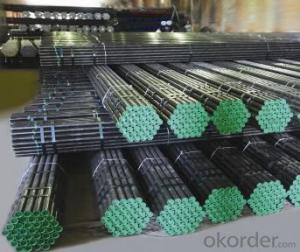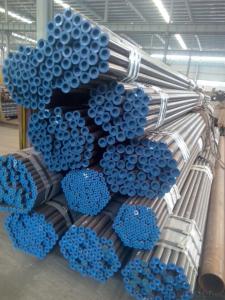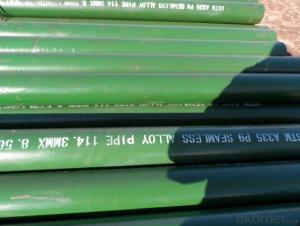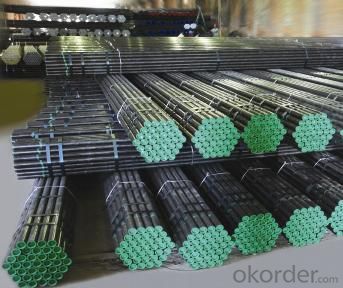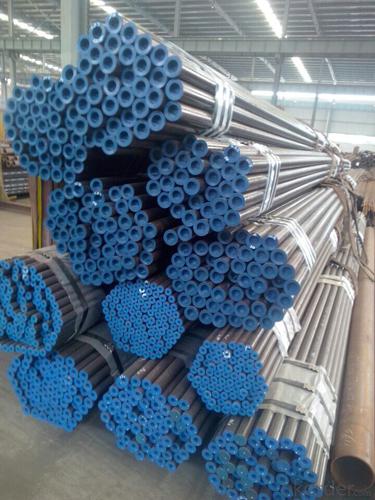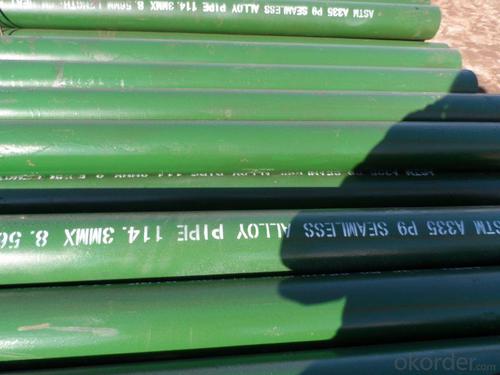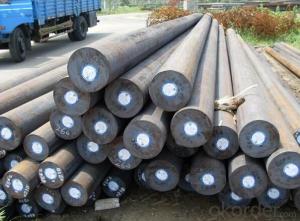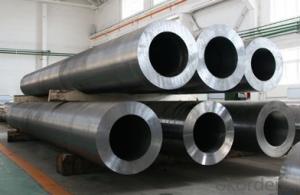Steel pipe A335P9 18-26
- Loading Port:
- China Main Port
- Payment Terms:
- TT OR LC
- Min Order Qty:
- -
- Supply Capability:
- 200T m.t./month
OKorder Service Pledge
OKorder Financial Service
You Might Also Like
A335P9 Steel pipe The standing stock of specifications
A335P9 Steel pipe 70*4.5-5-6-7-8-9-10-12-15-16
A335P9 Steel pipe 245*8-10-14-17-20 -22-30-40
P5 C≤0.15 Mn 0.3-0.6 P ≤0.25 S≤0.25
Si 0.25-1.0 Cr 8-10 Mo 0.9-1.1
Alloy pipe is a steel pipe according to the production materials (i.e. material) to define, just as its name implies is made of alloy steel seamless pipe; and is in accordance with the production process (seamed seamless) to define, seamed pipe seamless pipe is different from, including straight seam welded pipe and spiral tube.
Manufacturing process
1 hot-rolled (extrusion seamless pipe): billet, heating, perforation, three roll cross rolling, rolling or extrusion, tube off, sizing pipe (or reducing), cooling, straightening, water pressure test (or testing), marking, storage
2 cold drawing (rolling) seamless steel pipe: billet, heating, perforation, heading, annealing, pickling, oiling round tube (copper) and multi pass drawing (Leng Zha), the blank pipe, heat treatment, straightening, water pressure test (testing), marking, storage
[(diameter - thickness) * wall thickness of]*0.02466=kg/ meters (per metre weight)
Alloy pipe use
Alloy pipe for low and medium pressure boiler (work pressure is generally not more than 5.88Mpa, the operating temperature at 450 DEG C) of the heating surface tube; used for high pressure boiler (work pressure is generally above 9.8Mpa, operate at a temperature of 450 DEG to 650 DEG C between) the heating surface tubes, economizer, superheater, reheater, petrochemical industry uses the tube and so on.
- Q: What is the difference between carbon steel and alloy steel pipes?
- Carbon steel and alloy steel pipes are both types of steel pipes, but they differ in their composition and properties. Carbon steel pipes are made primarily from carbon and iron, with small amounts of other elements such as manganese, silicon, and copper. They are known for their strength and durability, making them a popular choice for various applications in industries such as construction, oil and gas, and automotive. Carbon steel pipes are relatively inexpensive and have good resistance to corrosion. On the other hand, alloy steel pipes are made by adding other alloying elements to carbon steel. These alloying elements can include elements such as chromium, nickel, molybdenum, and vanadium, among others. The addition of these elements enhances the properties of the steel, such as increased strength, improved corrosion resistance, and better heat resistance. Alloy steel pipes are commonly used in high-temperature and high-pressure applications, such as in power plants, refineries, and chemical plants. In terms of cost, alloy steel pipes are generally more expensive than carbon steel pipes due to the additional alloying elements. However, the added benefits in performance and durability can often justify the higher cost. In summary, the main difference between carbon steel and alloy steel pipes lies in their composition and properties. Carbon steel pipes are primarily made of carbon and iron, while alloy steel pipes contain additional alloying elements for enhanced properties. Carbon steel pipes are known for their strength and affordability, while alloy steel pipes offer improved strength, corrosion resistance, and heat resistance.
- Q: What is the difference between internal coating and external lining of steel pipes?
- Steel pipes can be protected from corrosion and damage through two different methods: internal coating and external lining. When it comes to internal coating, a protective layer or coating is applied to the inner surface of the steel pipe. This is done to prevent corrosion or damage caused by the fluid or substance being transported through the pipe. Common materials used for the coating include epoxy, polyurethane, or polyethylene. These materials create a barrier between the pipe and the transported material, thus extending the pipe's lifespan and preserving the quality of the transported material. On the other hand, external lining involves applying a protective layer or lining to the outer surface of the steel pipe. The purpose of this is to shield the pipe from external elements like soil, moisture, chemicals, and physical damage. Materials such as polyethylene, polypropylene, or fusion-bonded epoxy are typically used for the external lining. By acting as a barrier, the lining prevents corrosive substances from coming into contact with the pipe and causing harm. Additionally, it helps maintain the pipe's structural integrity and prevents the formation of leaks or cracks. To summarize, the main distinction between internal coating and external lining of steel pipes lies in where the protective layer is applied. Internal coating focuses on the inner surface of the pipe, while external lining concentrates on the outer surface. While both methods aim to safeguard the pipe from corrosion and damage, they address different aspects of pipe protection.
- Q: How are steel pipes used in the manufacturing of pressure vessels?
- Steel pipes are commonly used in the manufacturing of pressure vessels as they provide the necessary strength and durability to withstand high internal pressure. These pipes are welded or seamless and are often used as the main structural component of the vessel. They allow for the efficient flow of fluids or gases within the vessel and provide a reliable and secure containment system for various industrial applications.
- Q: How do steel pipes handle pressure surges?
- Steel pipes possess exceptional strength and durability, enabling them to effectively manage pressure surges. When pressure surges arise within a pipeline system, steel pipes exhibit the capability to withstand and absorb heightened forces without experiencing breakage or rupture. The commendable tensile strength of steel grants resistance against the pressure imposed upon the pipes, preventing deformation or collapse during sudden surges. Furthermore, steel pipes possess a commendable burst pressure rating, signifying their capacity to endure substantial pressure increases without succumbing to failure. Additionally, steel pipes are frequently engineered with thicker walls, bolstering their capacity to handle pressure surges. The increased wall thickness assists in distributing the augmented force evenly, thereby minimizing the possibility of localized stress and potential points of failure. Moreover, steel pipes are frequently employed in conjunction with fittings and valves specially designed to tackle pressure surges. These fittings and valves are composed of similar materials, ensuring compatibility and preserving the integrity of the pipeline system. All in all, steel pipes are excellently suited to manage pressure surges due to their strength, durability, and ability to endure high pressures. Their resistance to deformation, notable burst pressure rating, and compatibility with specialized fittings and valves render them a dependable choice for applications where pressure surges may arise.
- Q: How are steel pipes used in high-rise buildings?
- Steel pipes are used in high-rise buildings for various purposes, including structural support, water supply, and sewage disposal. They are commonly used as columns and beams to provide strength and stability to the building's framework. Additionally, steel pipes are utilized for plumbing systems, carrying water from the ground floor to the upper levels, as well as facilitating the disposal of wastewater. Overall, steel pipes play a crucial role in ensuring the safety and functionality of high-rise buildings.
- Q: How are steel pipes classified based on their end connections?
- Steel pipes can be classified based on their end connections into three main categories: threaded, socket-weld, and butt-weld.
- Q: Can steel pipes be used for piling?
- Certainly, piling can involve the utilization of steel pipes. Steel pipes find widespread use in piling applications owing to their robustness, endurance, and adaptability. They possess the ability to endure the weight and pressure exerted by the soil, thus furnishing a steadfast base for constructions. The process of driving specialized equipment ensures the secure placement of steel pipes employed for piling. Moreover, steel pipes can be effortlessly trimmed and fused to the desired dimensions, rendering them suitable for diverse piling endeavors.
- Q: Can steel pipes be used for underground chemical pipelines?
- Yes, steel pipes can be used for underground chemical pipelines. Steel pipes are known for their durability, strength, and resistance to corrosion, making them suitable for transporting various chemicals underground. However, it is important to consider the specific type of chemical being transported and consult with experts to ensure that the steel pipes are compatible with the chemical composition to avoid any potential reactions or degradation.
- Q: How are steel pipes inspected for quality?
- Steel pipes are inspected for quality through various methods such as visual inspection, non-destructive testing techniques like ultrasonic testing, magnetic particle inspection, and radiographic testing. These inspections help identify any defects, cracks, or imperfections in the pipes, ensuring they meet the required quality standards. Additionally, mechanical tests such as tensile strength and hardness tests may also be conducted to assess the structural integrity of the steel pipes.
- Q: How are steel pipes protected from damage during transportation?
- Steel pipes are protected from damage during transportation through various methods. One common method is the use of protective coatings. Steel pipes are often coated with materials such as epoxy, zinc, or polyethylene to create a barrier between the pipe and external elements. These coatings help to prevent corrosion and damage during transit. Furthermore, steel pipes are often bundled together and secured using straps or bands. This bundling helps to keep the pipes in place and prevents them from shifting or rolling during transportation. Additionally, padding or cushioning materials such as foam or rubber may be used to provide extra protection and minimize the risk of damage from impact or vibration. In some cases, steel pipes may be placed in crates or containers to provide additional protection. Crates are designed to fit the pipes snugly and provide a secure enclosure that prevents external forces from causing damage. Containers, on the other hand, offer a protective environment for the pipes, shielding them from the elements and potential impacts. To ensure the safe transportation of steel pipes, it is also important to consider proper handling and loading techniques. Pipes should be carefully lifted and loaded onto transport vehicles using appropriate equipment, such as cranes or forklifts, to minimize the risk of damage. Proper securing of the pipes within the transport vehicle is crucial to prevent movement and potential damage during transit. Overall, a combination of protective coatings, bundling, padding, and secure packaging or loading techniques are employed to safeguard steel pipes from damage during transportation. These measures help to ensure that the pipes arrive at their destination in optimal condition, ready for use in various applications.
Send your message to us
Steel pipe A335P9 18-26
- Loading Port:
- China Main Port
- Payment Terms:
- TT OR LC
- Min Order Qty:
- -
- Supply Capability:
- 200T m.t./month
OKorder Service Pledge
OKorder Financial Service
Similar products
Hot products
Hot Searches
Related keywords
